人教版英语八年级下册Unit1知识点
人教版英语八年级下册Unit1知识点归纳
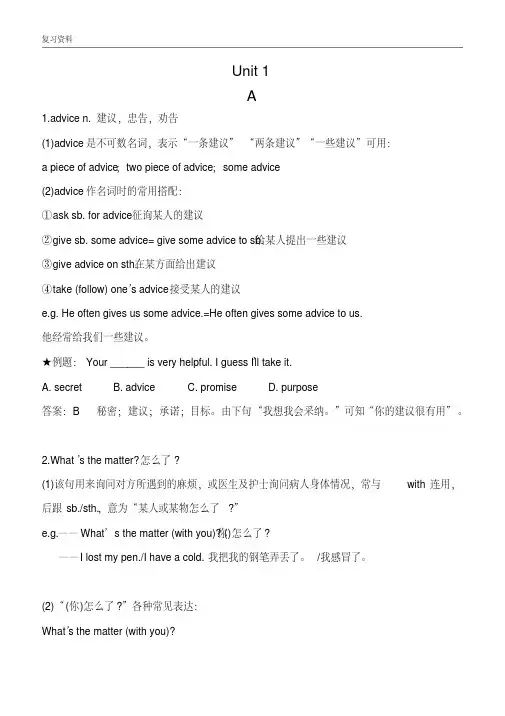
Unit 1A1.advice n. 建议,忠告,劝告(1)advice是不可数名词,表示“一条建议”“两条建议”“一些建议”可用:a piece of advice;two piece of advice;some advice(2)advice作名词时的常用搭配:①ask sb. for advice征询某人的建议②give sb. some advice= give some advice to sb.给某人提出一些建议③give advice on sth.在某方面给出建议④take (follow) one’s advice接受某人的建议e.g. He often gives us some advice.=He often gives some advice to us.他经常给我们一些建议。
★例题:Your ______ is very helpful. I guess I’ll take it.A. secretB. adviceC. promiseD. purpose答案:B 秘密;建议;承诺;目标。
由下句“我想我会采纳。
”可知“你的建议很有用”。
2.What’s the matter?怎么了?(1)该句用来询问对方所遇到的麻烦,或医生及护士询问病人身体情况,常与with连用,后跟sb./sth.,意为“某人或某物怎么了?”e.g.——What’s the matter (with you)? (你)怎么了?——I lost my pen./I have a cold. 我把我的钢笔弄丢了。
/我感冒了。
(2)“(你)怎么了?”各种常见表达:What’s the matter (with you)?=What’s the trouble (with you)?=What’s the problem(with you)?=What’s wrong (with you)?=What’s up?=What happened?★例题:——Nick is not at school. _______?——He has a cold.A. Who’s thatB. What’s the matterC. How old is heD. How much is it答案:B 句意:——Nick没来上学。
最全面人教版八年级下册英语第一单元知识点归纳总结
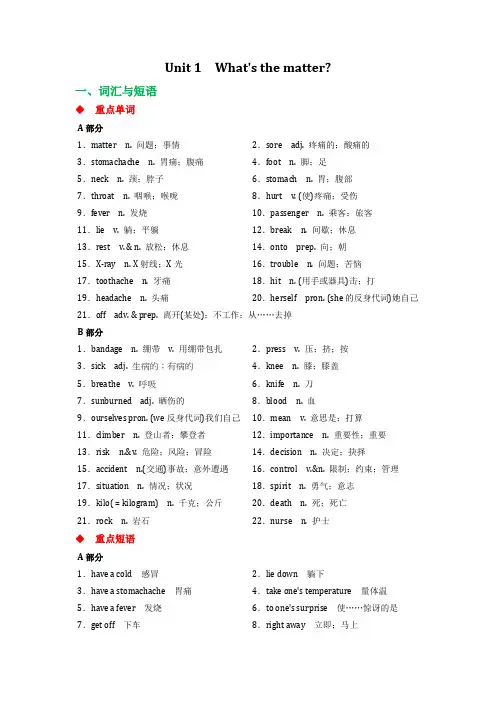
Unit 1 What's the matter?一、词汇与短语◆重点单词A部分1.matter n. 问题;事情2.sore adj. 疼痛的;酸痛的3.stomachache n. 胃痛;腹痛4.foot n. 脚;足5.neck n. 颈;脖子6.stomach n. 胃;腹部7.throat n. 咽喉;喉咙8.hurt v. (使)疼痛;受伤9.fever n. 发烧10.passenger n. 乘客;旅客11.lie v. 躺;平躺12.break n. 间歇;休息13.rest v. &n. 放松;休息14.onto prep. 向;朝15.X-ray n. X射线;X光16.trouble n. 问题;苦恼17.toothache n. 牙痛18.hit n. (用手或器具)击;打19.headache n. 头痛20.herself pron. (she的反身代词)她自己21.off adv. & prep. 离开(某处);不工作;从……去掉B部分1.bandage n. 绷带v. 用绷带包扎2.press v. 压;挤;按3.sick adj. 生病的;有病的4.knee n. 膝;膝盖5.breathe v. 呼吸6.knife n. 刀7.sunburned adj. 晒伤的8.blood n. 血9.ourselves pron. (we反身代词)我们自己10.mean v. 意思是;打算11.climber n. 登山者;攀登者12.importance n. 重要性;重要13.risk n.&v. 危险;风险;冒险14.decision n. 决定;抉择15.accident n.(交通)事故;意外遭遇16.control v.&n. 限制;约束;管理17.situation n. 情况;状况18.spirit n. 勇气;意志19.kilo( = kilogram) n. 千克;公斤20.death n. 死;死亡21.rock n. 岩石22.nurse n. 护士◆重点短语A部分1.have a cold 感冒2.lie down 躺下3.have a stomachache 胃痛4.take one's temperature 量体温5.have a fever 发烧6.to one's surprise 使……惊讶的是7.get off 下车8.right away 立即;马上9.take breaks (take a break) 休息10.talk too much 说得太多11.drink enough water 喝足够的水12.have a very sore throat 嗓子非常疼13.get an X-ray 拍X光片14.see a dentist 看牙医15.drink some hot tea with honey 喝一些加蜂蜜的热茶16.put some medicine on sth.在……上面敷一些药17.feel very hot 感到很热18.sound like 听起来像19.all weekend 整个周末20.in the same way 以同样的方式21.go to a doctor 看医生22.go along 沿着……走23.on the side of the road 在马路边24.shout for help 大声呼救25.without thinking twice 没有多想26.have a heart problem 有心脏病27.thanks to 多亏了;由于28.in time 及时29.save a life 挽救生命30.get into trouble 陷入麻烦31.hurt oneself 受伤32.fall down落下;摔倒B部分1.be used to 习惯于……;适应于……2.in a difficult situation 在困境中3.take risks (take a risk) 冒险4.keep on doing sth. 继续(或坚持)做某事5.run out (of) 用尽;耗尽6.make a decision 作出决定7.cut off 切除8.get hit on the head 撞到头部9.get out of 离开;从……岀来10.be interested in 对……感兴趣11.give up 放弃12.mean doing sth. 意味着做某事13.put a bandage on sth. 用绷带包扎…14.lose one's life 失去生命15.feel sick 感到恶心16.mountain climbing 登山运动17.have problems breathing 呼吸困难18.be in control of 掌管;管理◆重点句子A部分1.What's the matter with you?=What's the trouble with you?=What's wrong with you?你怎么了?2.What should she do? 她该怎么办呢?3.Did you fall down? 你跌倒了吗?4.Should I take my temperature? 我应该量一下体温吗?5.I think I sat in the same way for too long without moving.我想我以同样的姿势一动不动地坐得太久了。
人教版八年级英语下册Unit1知识点归纳
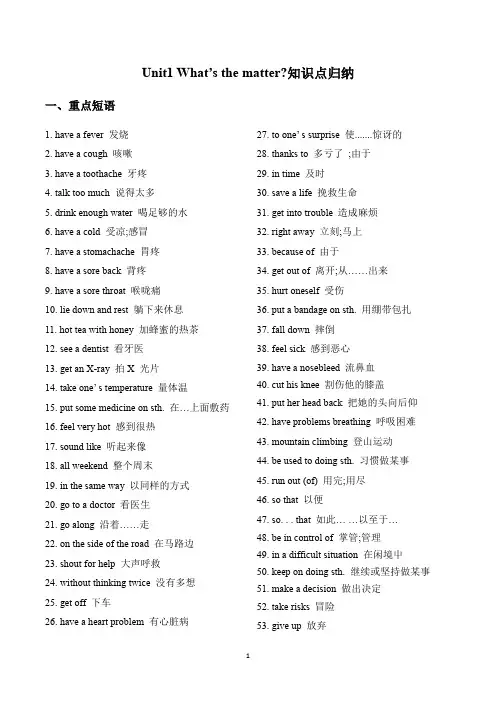
Unit1 What’s the matter?知识点归纳一、重点短语1. have a fever 发烧2. have a cough 咳嗽3. have a toothache 牙疼4. talk too much 说得太多5. drink enough water 喝足够的水6. have a cold 受凉;感冒7. have a stomachache 胃疼8. have a sore back 背疼9. have a sore throat 喉咙痛10. lie down and rest 躺下来休息11. hot tea with honey 加蜂蜜的热茶12. see a dentist 看牙医13. get an X-ray 拍X 光片14. take one’ s temperature 量体温15. put some medicine on sth. 在…上面敷药16. feel very hot 感到很热17. sound like 听起来像18. all weekend 整个周末19. in the same way 以同样的方式20. go to a doctor 看医生21. go along 沿着……走22. on the side of the road 在马路边23. shout for help 大声呼救24. without thinking twice 没有多想25. get off 下车26. have a heart problem 有心脏病27. to one’ s surprise 使.......惊讶的28. thanks to 多亏了;由于29. in time 及时30. save a life 挽救生命31. get into trouble 造成麻烦32. right away 立刻;马上33. because of 由于34. get out of 离开;从……出来35. hurt oneself 受伤36. put a bandage on sth. 用绷带包扎37. fall down 摔倒38. feel sick 感到恶心39. have a nosebleed 流鼻血40. cut his knee 割伤他的膝盖41. put her head back 把她的头向后仰42. have problems breathing 呼吸困难43. mountain climbing 登山运动44. be used to doing sth. 习惯做某事45. run out (of) 用完;用尽46. so that 以便47. so. . . that 如此… …以至于…48. be in control of 掌管;管理49. in a difficult situation 在闲境屮50. keep on doing sth. 继续或坚持做某事51. make a decision 做出决定52. take risks 冒险53. give up 放弃二、用法归纳1.need to do sth.需要去做某事2.see sb. doing sth.看见某人正在做某事3.ask sb. sth.询问某人某事4.expect sb. to do sth.期望某人做某事5.agree to do sth.同意做某事6.help sb. ( to ) do sth.帮助某人做某事7.want to do sth.想要做某事8.tell sb. To do sth.告诉某人做某事9.have problems (in) doing sth.做某事有困难e sth. To do sth. 用某物去做某事11.be/get used to doing sth.习惯于做某事12.seem to do sth.好像做某事13.keep on doing sth.继续做某事14.mind doing sth.介意做某事三、重点句型1. What’ s the matter? 你怎么了?What’ s the matter with you? = What’s the trouble with you? = What’ s wrong with you?2. What should she do? 她该怎么办呢?Should I take my temperature? 我应该量一下体温吗?主语+ should/shouldn’t + 动词原形. ..①You should lie down and rest.你应该躺下休息一会儿。
(完整版)新人教版八年级英语下册unit1知识点
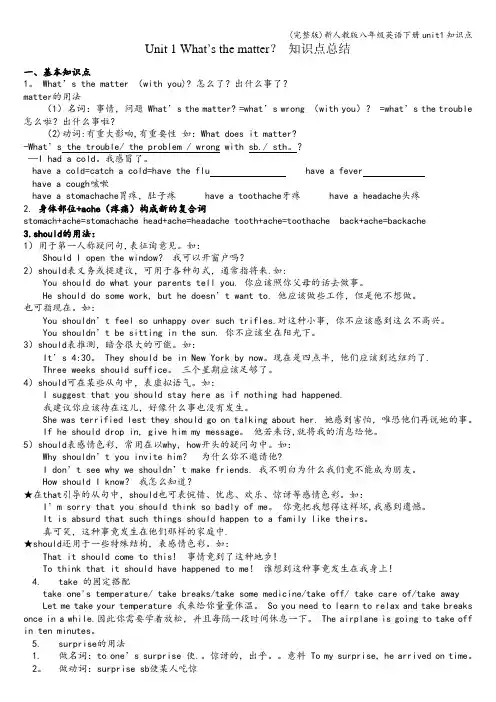
Unit 1 What’s the matter?知识点总结一、基本知识点1。
What’s the matter (with you)? 怎么了?出什么事了?matter的用法(1)名词:事情,问题 What’s the matter? =what’s wrong (with you)? =what’s the trouble 怎么啦?出什么事啦?(2)动词:有重大影响,有重要性如:What does it matter?-What’s the trouble/ the problem / wrong with sb./ sth。
?—I had a cold。
我感冒了。
have a cold=catch a cold=have the flu have a feverhave a cough咳嗽have a stomachache胃疼,肚子疼 have a toothache牙疼 have a headache头疼2. 身体部位+ache(疼痛)构成新的复合词stomach+ache=stomachache head+ache=headache tooth+ache=toothache back+ache=backache3.should的用法:1)用于第一人称疑问句,表征询意见。
如:Should I open the window?我可以开窗户吗?2)should表义务或提建议,可用于各种句式,通常指将来.如:You should do what your parents tell you. 你应该照你父母的话去做事。
He should do some work, but he doesn’t want to. 他应该做些工作,但是他不想做。
也可指现在。
如:You shouldn’t feel so unhappy over such trifles.对这种小事,你不应该感到这么不高兴。
You shouldn’t be sitting in the sun. 你不应该坐在阳光下。
Unit 1 What 's the matter 知识点讲解带练习 课件 人教版英语八年级下册
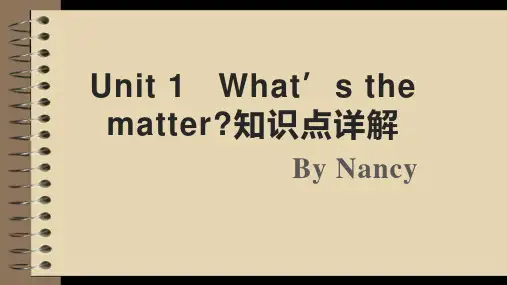
谢谢大家!
三、语法知识
● 1.询问某人的身体状况及遇到麻烦的表达方法 ● What’s the matter (with sb.)?(某人)怎么了? ● What’s wrong (with sb.)? ● What’s the trouble (with sb.)?
●2. 表达身体疼痛或不舒服的句型
● ①某人+have/has+病症/身体部位+ache. ● ②某人+have/has+a+sore+发病部位. ● ③某人+hurt(s)+身体部位或反身代词(oneself). ● ④某部位+hurt(s). ● ⑤There is something wrong with one’s+sb/部位
●
= have difficulty doing
●
= have problems doing
●
●4.反身代词
● 【考点】① 第一人称和第二人称的反身代词 形代+self
●
② 第三人称的但身代词宾格+self
●
③ 常见的搭配
● enjoy oneself=have a good time=have fun玩的开心 ● help yourselves/yourself随便吃;别拘束 ● by oneself= on sb’s own靠某人自己;独立
● (一)单项选择
● 5. The old man is used to __________ tea after he gets up.
● A. drink
B. drinks
C. drinking
D. drank
● 6. Don't forget to take your bag when you________ the bus.
Unit1语法知识点梳理人教版英语八年级下册
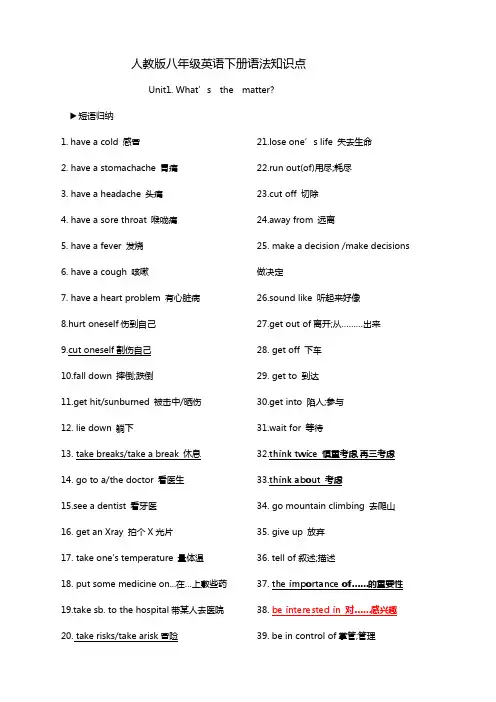
人教版八年级英语下册语法知识点Unit1. What’s the matter?▶短语归纳1.have a cold 感冒2. have a stomachache 胃痛3. have a headache 头痛4. have a sore throat 喉咙痛5. have a fever 发烧6. have a cough 咳嗽7. have a heart problem 有心脏病8.hurt oneself伤到自己9.cut oneself割伤自己10.fall down 摔倒;跌倒11.get hit/sunburned 被击中/晒伤12. lie down 躺下13. take breaks/take a break 休息14. go to a/the doctor 看医生15.see a dentist 看牙医16. get an Xray 拍个X光片17. take one's temperature 量体温18. put some medicine on...在…上敷些药19.take sb. to the hospital带某人去医院20. take risks/take arisk冒险21.lose one’s life 失去生命22.run out(of)用尽;耗尽23.cut off 切除24.away from 远离25. make a decision /make decisions 做决定26.sound like 听起来好像27.get out of离开;从………出来28. get off 下车29. get to 到达30.get into 陷人;参与31.wait for 等待32.think twice 慎重考虑,再三考虑33.think about 考虑34. go mountain climbing 去爬山35. give up 放弃36. tell of叙述;描述37. the importance of……的重要性38. be interested in 对……感兴趣39. be in control of掌管;管理40.to one ’s surprise 使某人惊讶的是; 出乎某人的意料 41.thanks to 多亏;由于 42.in time 及时43.right away=at once 立即;马上 44. because of 因为 45.by oneself 独自;单独 46. too much 太多 47.a few 一些48.all weekend 整个周末 49. so that 以便▶用法集萃sth.需要某物1. needto do sth.需要做某事doing sth.某事需要被做2. see sb ..doing sth.看见某人正在做某事 do sth.看见某人做了某事3.mean to do sth.打算做某事 doing sth.意味着做某事4. expect/want (sb. ) to do sth 期待(某人)做某事/想要(某人)做某事 6. seem(to be)+形容词 好像……seem to do sth.好像做某事 seem + that 从句 好像.…7. agree/happen to do sth. 同意做某事/碰巧做某事 8.help sb.(to)do sth. 帮助某人做某事9.tell sb.(not)to do sth. 告诉某人(不要)做某事10.have problems(in)doing sth. 做某事有困难11. use sth. to do sth.= use sth. for doing sth.用某物做某事12. give up/ keep on doing sth. 放弃做某事/继续做某事13.mind doing sth.介意做某事14.so+形容词/副词+that从句15.It is/was+形容词+ that 从句如此……以至于…"某事是…▶语法专项一.询问某人的健康问题及遇到麻烦时的常用表达1.询问某人患了何种疾病或遇到了何种麻烦时,常用以下几种结构来表达: What's the matter (with sb.)?(某人)怎么了?What's wrong (with sb.)?(某人)怎么了?What's the trouble ( with sb.)?/ (某人)出什么事了?What happened (to sb.)?(某人)发生什么事了?Are you OK?你没事吧?Is there anything wrong( with sb. )?(某人)有什么事吗?2.要表达身体某一部位疼痛或不舒服,可用以下结构:(1)某人+have/has+病症The twins have colds.这对双胞胎感冒。
人教版英语八年级下册unit1单元知识点归纳总结
人教版英语八年级下册Unit1 What’s the matter?重点短语1.have a fever 发烧2. have a cough 咳嗽3. have a toothache 牙疼4. talk too much 说得太多5. drink enough water 喝足够的水6. have a cold 受凉;感冒7. have a stomachache 胃疼8. have a sore back 背疼9. have a sore throat 喉咙痛10. lie down and rest 躺下来休息11. hot tea with honey 加蜂蜜的热茶12. see a dentist 看牙医13. get an X-ray 拍X 光片14. take one’ s temperature 量体温15. put some medicine on sth. 在……上面敷药16. feel very hot 感到很热17. sound like 听起来像18. all weekend 整个周末19. in the same way 以同样的方式20. go to a doctor 看医生21. go along 沿着……走22. on the side of the road 在马路边23. shout for help 大声呼救24. without thinking twice 没有多想25. get off 下车26. have a heart problem 有心脏病27. to one’ s surprise 使....... 惊讶的28. thanks to 多亏了;由于29. in time 及时30. save a life 挽救生命31. get into trouble 造成麻烦32. right away 立刻;马上33. because of 由于34. get out of 离开;从……出萍35. hurt oneself 受伤36. put a bandage on sth. 用绷带包扎37. fa ll down 摔倒38. feel sick 感到恶心39. have a nosebleed 流鼻血40. cut his knee 割伤他的膝盖41. put her head back 把她的头向后仰42. have problems breathing 呼吸困难43. mountain climbing 登山运动44. be used to doing sth. 习惯做某事45. run out (of) 用完;用尽46. so that 以便47. so. . . that 如此… …以至于…48. be in control of 掌管;管理49. in a difficult situation 在闲境中50. keep on doing sth. 继续或坚持做某事51. make a decision 做出决定52. take risks 冒险53. give up 放弃Section A1. What’ s the matter? 怎么啦?出什么事情了?【解析】matter/ ' mætə(r)) /n.问题;事情What’ s the matter with you?= What’s the trouble with you?= What’ s wrong with you?你怎么了?【注】:matter 和trouble 为名词,其前可加the 或形容词性物主代词,wrong 是adj.不能加the 【用法】用于询问某人有什么病或某人遇到什么麻烦、问题其后跟询问对象时,与介词with连用。
人教版英语八年下学期 Unit1考点重点知识点作文整理
新目标英语八年下考点,重点,知识点整理Unit 1 What’s the matter?本单元考点,重点三个:一.询问身体不适并给出建议的句型二.v.-ing形式的非谓语动词三.反身代词一.询问身体不适并给出建议的句型:(一)对“身体不适”的提问:“怎么了?”1.What’s the matter (with you)?2.What’s the trouble (with you)?=3.What’s your trouble?4.What’s wrong(with you)?5.What’s up?6.What happens to you?7.What’s the problem(with you)?(二)“身体不适”的简要表达:1.主语+ have/has + a + 病症(1) I have a cold.= I catch a cold. =I get a cold. =I have the flu.我感冒了。
I have a bad cold.我得了重感冒。
(2) I have a fever.我发烧了。
I have a high fever.我发高烧了。
(3) I have a cough.我咳嗽了。
(4) I have a nosebleed.我出鼻血了。
2.主语+ have /has + a + 身体部位-ache(1) I have a toothache.我牙疼。
I have a bad toothache.我牙疼的厉害。
(2) I have a stomachache.我胃疼。
(3) I have a headache.我头疼。
(4) I have a backache.我后背疼。
3.主语+ have/has + a + sore + 发病部位(1) I have a sore back.我后背疼。
(2) I have a sore throat.我嗓子疼。
I have a very sore throat.我嗓子疼的厉害。
人教版新版八年级英语下册Unit1 知识要点
Unit1 What’s the matter?一、语法:1、对身体健康状况的询问询问病人病情时最常用的是:What’s the matter?意思是“怎么了”,其后通常与with连用。
What’s the matter with him/her…?他/她怎么了?类似的问句还有:What’s wrong?What’s wrong with you?What’s your trouble?What’s the trouble with you?What’s up?回答:He/She has a cold.他(她)感冒了。
have a/an + 疾病名词“患……病”(a toothache牙疼;a fever发烧;a sore throat喉咙痛;a stomachache胃痛;a cough咳嗽;a headache头疼;a sore back背痛;a nosebleed流鼻血;a heart problem心脏病)身体部位+ache(疼痛)构成新的复合词stomach+ache=stomachachehead+ache=headache tooth+ache=toothache back+ache=backache后背痛He hurt himself.(She hurt herself.)他伤到了自己。
He gets sunburned.他晒伤了。
cut his finger 切手指get hit on the head 撞到头get hit by the ball 被球撞到get sick 感到不舒服cut himself 割伤自己2、情态动词should的用法①表示“应该,应当”should作为情态动词最基本的意思是“应该”——既可指有责任或义务“应该”做某事。
He should work harder. 他应该更加努力。
You should help your mother with the housework. 你应该帮你母亲做家务。
Unit1知识点归纳人教版八年级英语下册
八下Unit 11.W hat’s the matter?怎么了?What’s the matter with you? 你怎么了?这个句子常用来询问身体情况。
其他用法W hat’s the matter with your computer?你的电脑怎么了?同义句:W hat’s wrong (with…) ?2.Have a fever/ headache/ toothache/ stomachache/ sore throat/ sore back用have 表达身体上的不舒服(physical problems)3.see sb. lying on the side of the road看见某人躺在路边lie躺-lay-lain-lying4.without thinking twice _______________________________________think twice 多想5.shout for help大声求助,喊人帮忙ask for help求助6.hurt 及物动词:使受伤,使疼痛I hurt my leg yesterday_________________________________不及物动词:疼痛,带来伤害My leg hurts a lot.我的腿很疼。
hurt-hurt-hurt-hurtingget hurt受伤7.t o one’s surprise令某人惊讶的是To our surprise, the boy won the race. ___________________,那个男孩赢得了比赛in surprise惊讶地He looked at me in surprise, 他惊讶地看着我。
令我惊讶的是________________________ 令他们惊讶的是_______________________令Tom惊讶的是________________________8.get into trouble遇到麻烦,陷入麻烦troublen.困难;难题;动荡;骚乱;麻烦;机器故障;身体不适;工夫;力气;引起担心、不便的原因What’s the trouble?v.使烦恼;苦恼;忧虑;费力;费神;因…而烦恼;使疼痛;劳驾;麻烦The grammar troubled me a lot and even drove me crazy.语法让使我很烦,甚至让我发疯。
- 1、下载文档前请自行甄别文档内容的完整性,平台不提供额外的编辑、内容补充、找答案等附加服务。
- 2、"仅部分预览"的文档,不可在线预览部分如存在完整性等问题,可反馈申请退款(可完整预览的文档不适用该条件!)。
- 3、如文档侵犯您的权益,请联系客服反馈,我们会尽快为您处理(人工客服工作时间:9:00-18:30)。
Unit 1A1.advice n. 建议,忠告,劝告(1)advice是不可数名词,表示“一条建议”“两条建议”“一些建议”可用:a piece of advice;two piece of advice;some advice(2)advice作名词时的常用搭配:①ask sb. for advice征询某人的建议②give sb. some advice= give some advice to sb.给某人提出一些建议③give advice on sth.在某方面给出建议④take (follow) one’s advice接受某人的建议e.g. He often gives us some advice.=He often gives some advice to us. 他经常给我们一些建议。
★例题:Your ______ is very helpful. I guess I’ll take it.A. secretB. adviceC. promiseD. purpose答案:B 秘密;建议;承诺;目标。
由下句“我想我会采纳。
”可知“你的建议很有用”。
2.What’s the matter?怎么了?(1)该句用来询问对方所遇到的麻烦,或医生及护士询问病人身体情况,常与with连用,后跟sb./sth.,意为“某人或某物怎么了?”e.g.——What’s the matter (with you)? (你)怎么了?——I lost my pen./I have a cold. 我把我的钢笔弄丢了。
/我感冒了。
(2)“(你)怎么了?”各种常见表达:What’s the matter (with you)?=What’s the trouble (with you)?=What’s the problem(with you)?=What’s wrong (with you)?=What’s up?=What happened?★例题:——Nick is not at school. _______?——He has a cold.A. Who’s thatB. What’s the matterC. How old is heD. How much is it答案:B 句意:——Nick没来上学。
怎么回事? ——他感冒了。
①此类句型中,matter,problem前需加定冠词the,trouble前可加the或形容词性物主代词;wrong是形容词,其前不加任何修饰词。
②此类句型中,what即为句子主语,本身构成陈述语序,故当句子以宾语从句身份出现时,不可将be移至the matter/trouble/problem之后。
3.have a stomachache胃疼(1)have +a(n)+名词,表示患某种病e.g. have a cold感冒 have a toothache牙疼have a fever发烧 have a headache头疼拓展:sore与pain也可用于表示疾病的短语e.g. have a sore throat(back/knee…)嗓子疼(背疼/膝盖疼…)have a pain in the back(foot/knee…)背疼(脚疼/膝盖疼)(2)stomachache可数名词,意为“胃疼;腹疼”,是由名词stomach(胃;腹部)加ache(疼痛)构成的复合名词。
“身体部位+ache”构成疾病名称headache头疼 toothache牙疼 backache背疼★例题:——Mom,I _____.——I’m so rry to hear that,dear. We must go to see the dentist right away.A. have a headacheB. have a stomachacheC. have a toothache答案:C 由下文“dentist”可知孩子牙疼。
4.foot n. 脚foot作为可数名词用,其复数形式是feet。
e.g. This kind of animal has four feet.这种动物有四只脚。
(1)与foot变复数的变化形式相似的词还有:tooth-teeth牙齿 goose-geese 鹅(2)on foot步行,固定短语,相当于walk。
e.g. We came here on foot.=We walked here.我们走着来这儿的。
5.fever n. 发烧e.g. Tom has a fever.汤姆发烧了。
(1)have a fever=have a temperature=run a fever发烧e.g. I had a temperature last night.昨晚我发烧了。
★例题:Nancy took her temperature and found she had a _____.A. coughB. toothacheC. coldD. fever答案:D 由上文“南希量了一下体温”可知发现她发烧了。
(2)拓展:have a high temperature/fever发高烧6.lie v. 躺,平躺(1)lie的各种含义:①lie v. 躺,位于,平放 lay-lain-lyinge.g. You should lie down.你应该躺下。
His school lies in the north of the city.他的学校位于城北。
②lie v. 说谎 lied-lied-lyinge.g. He often lies.他经常说谎③lie n. 谎言 lies(复数)e.g. He often tells lies.他经常说谎。
★例题:Look,there is a wallet _____ on the playground.A. lieB. lyingC. layD. lain答案:B There be…doing sth.为固定句式,lie躺,位于,平放,其现在分词是lying。
(2)拓展:lay v. 下蛋,放置e.g. The hens lay a lot of eggs every day.母鸡每天下很多蛋。
Please lay the table before dinner.饭前请摆好餐具。
7.rest v. & n. 放松;休息(1)rest作及物动词,意为“使休息”,作不及物动词,意为“休息”。
e.g. You should rest your eyes after a lot of reading.在大量阅读之后,你应该休息一下你的眼睛。
I’m tired,and I want to rest.我累了,我想休息。
(2)rest也可以作名词,have/take a rest=have/take a break,意为“休息一下”。
e.g. Students have a rest/break after each lesson.学生们每节课后都休息一下。
8.feel v. 摸起来(1)feel常用作系动词,其后跟形容词作表语。
其主要用法有:①表示某物摸起来给人的感觉,通常要以被摸之物作主语,不可用于进行时态。
e.g. Your hand feels cold.你的手摸起来很凉。
Silk feels soft and smooth.丝绸摸起来柔软平滑。
②表示某人的感觉,以人作主语,可用于进行时态。
e.g. I feel fine./I’m feeling fine.我感觉良好。
/我现在感觉良好。
(2)归纳:常用的感官动词:feel摸起来,look看起来,sound听起来,taste 尝起来,smell闻起来。
(3)拓展:feel like +n. 意为“摸起来像…”e.g. This wallet feels like leather.这个钱包摸起来像是皮的。
★例题:This bed _____ soft and comfortable.A. soundsB. tastesC. feelsD. smells答案:C 句意:这张床摸起来柔软而且舒服。
9.without prep. 没有,缺乏(1)without后接名词、代词宾格或v.-ing作宾语,其反义词为with。
e.g. We got there without any trouble.我们到了那儿,一路上没遇到任何麻烦。
Can you finish your homework without him?没有他你能完成你的家庭作业吗?She left the room without saying a word.她一句话没有说就离开了房间。
★例题:The “teacher-free exam”means that students take their exams _____teachers. Students must be more honest.A. withoutB. againstC. throughD. by答案:A 没有;反对;通过;被。
由后句“学生们必须更加诚实”,可知“teacher-free exam”意思是没有老师监考的测试。
(2)拓展:without用于否定句,还可以表示条件,意为“如果没有”,相当于if 引导的否定条件句。
e.g. We couldn’t live without air.=We couldn’t live if there weren’t air.如果没有空气,我们就不能活。
★例题:W______ your help,I couldn’t have passed the exam.答案:Without 句意:如果没有你的帮助,我不能通过考试。
10.hurt v. (使)疼痛;受伤(1)hurt-hurt(过去式)-hurt(过去分词)(2)hurt作及物动词,表示“使疼痛,受伤;使不快”,后接宾语。
e.g. You hurt her feelings because you forgot her birthday.你伤了她的感情因为你忘记了她的生日。
A boy hurt himself in P.E. class.一个男孩在体育课上伤着自己了。
(3)hurt作不及物动词,表示“感到疼痛”。
e.g. My feet hurt. 我脚疼。
11. …when the driver saw an old man lying on the side of the road. ……,就在此时司机看到一位老人躺在路边。
(1)when引导时间状语从句,除常常有“当…时”之意外,放在过去进行时构成的主句之后,还以为“就在此时/那时;突然”相当于at this/that time。
